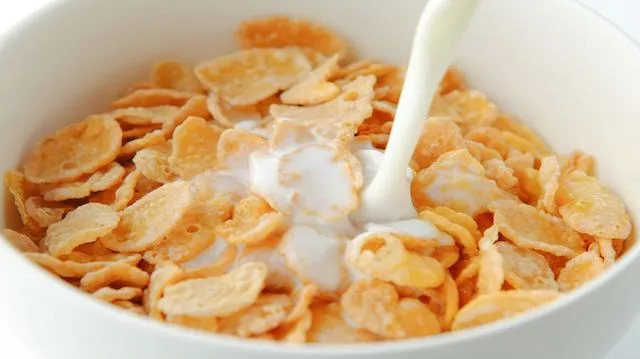
- Share on Facebook9
- Share on Pinterest
- Share on Twitter
In our pursuit to consume less dairy, less sugar, fewer grains and fewer carbs, the cereal industry is suffering decreased sales, and prices continue to soar. It seems our shift in tastes are not the only factors in this trend. Climate change and the cereal companies’ unwillingness to innovate their products have also been detrimental to the breakfast cereal industry.
Tastes have changed
Breakfast cereal has long been a staple for American families. How many of us as kids started our day with a sugary bowl of Frosted Flakes or Corn Pops? Today we prefer to make more informed food choices. We don’t want to eat GMO corn products, and we understand that starting the day with a high-sugar, high-carb meal sets us up for inflammation as we ride a blood sugar rollercoaster.
Martha C. White of NBC News recently reported on the soaring prices of breakfast cereal and cited these preference changes as an important factor. “People are consuming less milk, eating fewer carbs and looking for lower-sugar foods to feed their kids, while favoring higher-protein alternatives like Greek yogurt or protein shakes for breakfast.”
We want something new
It’s pretty clear that the American public wants more in terms of healthful food, yet cereal companies haven’t changed with the times. White cited Morningstar equity analyst Erin Lash, who pointed out that cereal manufacturers haven’t offered customers anything new “at a time when an array of breakfast alternatives stepped up their game.” Even companies that offer granola or muesli alternatives are having trouble moving products in our grocery stores.
Despite this reality — and analysts’ doubts — John Bryant, CEO of Kellogg Co. is optimistic. For readers who have sworn off breakfast cereal, Kellogg’s makes Frosted Flakes, Froot Loops and Coco Pops, as well as “healthier” alternatives, including All-Bran, FiberPlus and Crunchy Nut. The company’s net profit for 2014 was the lowest in over a decade, according to The Wall Street Journal.
 Yet Bryant stated that “while we definitely have more to do to improve performance, we’re confident that we’re focusing our investment on the right drivers of sales growth to continue recent trends.” Kellogg’s overall performance — which includes sales of its more popular snacks, cookies and crackers — is experiencing a decline, suggesting that the company doesn’t have the right drivers for growth. It may boil down to the fact that we simply want something new. But, there’s a larger global factor at play that deserves attention: climate change.
Yet Bryant stated that “while we definitely have more to do to improve performance, we’re confident that we’re focusing our investment on the right drivers of sales growth to continue recent trends.” Kellogg’s overall performance — which includes sales of its more popular snacks, cookies and crackers — is experiencing a decline, suggesting that the company doesn’t have the right drivers for growth. It may boil down to the fact that we simply want something new. But, there’s a larger global factor at play that deserves attention: climate change.
Climate change and food prices
Back in 2012 Oxfam International warned us about surging breakfast cereal prices due to climate change. The organization’s purpose is to create lasting solutions to world poverty, so food prices and climate trends factor heavily in Oxfam’s work. In its report, “Extreme Weather, Extreme Prices,” Oxfam cited extreme weather and the 2012 U.S. drought as major causes for food cost increases.
Based on its research, Oxfam predicts that if conditions remain as they are today, by 2030 we can expect the following:
- The price of maize to increase by 177 percent with half of the increase due to climate change;
- the price of wheat to increase by 120 percent with a third of the increase due to climate change, and
- the price of processed rice to increase by 107 percent with a third of the increase due to climate change.
The report further states that an extreme drought in North America alone could “increase world market export prices for maize by 140 percent and world market prices for wheat by 33 percent,” not to mention droughts elsewhere.
“There are reasons to expect more frequent food price spikes, given that it will be more common to see (weather) conditions that are considered extreme,” said David Lobell, assistant professor of environmental earth system science at Stanford University, quoted within the report.
Surging prices are bad news for everyone, especially as we attempt to improve the foods our kids eat, and organizations strive to end poverty and food deserts across the globe. However, it might be time for cereal companies to create other products that fall in line with our preferences for healthier, more wholesome food.
What factors play a role in your decision to avoid breakfast cereal?
—Megan Winkler
Megan Winkler is an author, historian, Neurosculpting® meditation coach, certified nutritional consultant and DIY diva. When she’s not writing or teaching a class, Megan can be found in the water, on a yoga mat, learning a new instrument or singing karaoke. Her passion for a healthy mind-body-spirit relationship motivates her to explore all the natural world has to offer.
Sources:
https://www.oxfam.org/sites/www.oxfam.org/files/file_attachments/20120905-ib-extreme-weather-extreme-prices-en_3.pdf
http://www.nbcnews.com/business/consumer/puffs-flakes-dollars-why-your-breakfast-cereal-costs-so-much-n433981
http://www.wsj.com/articles/kellogg-sees-a-bright-future-for-cereal-1441072675
https://www.thealternativedaily.com/planting-seeds-for-the-future/
- Share on Facebook9
- Share on Pinterest
- Share on Twitter

